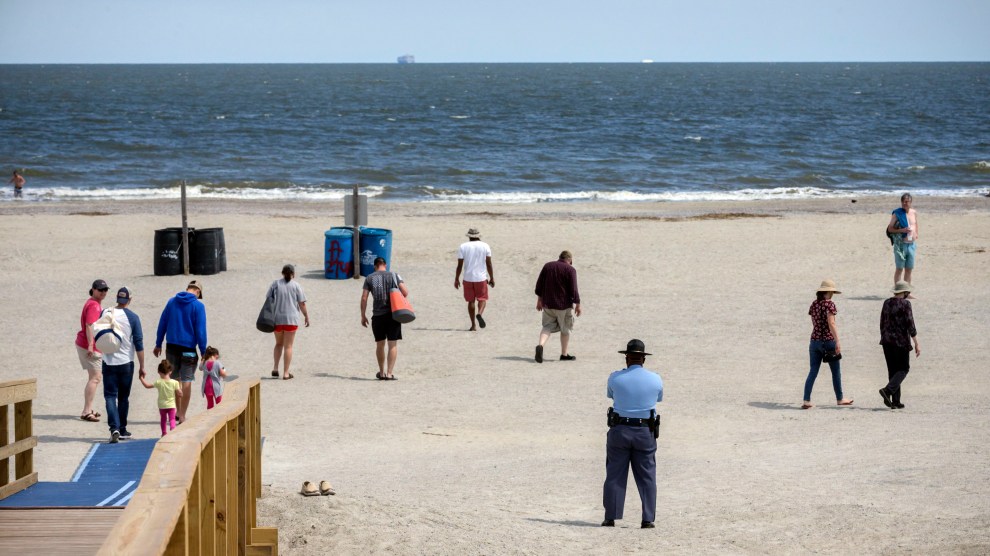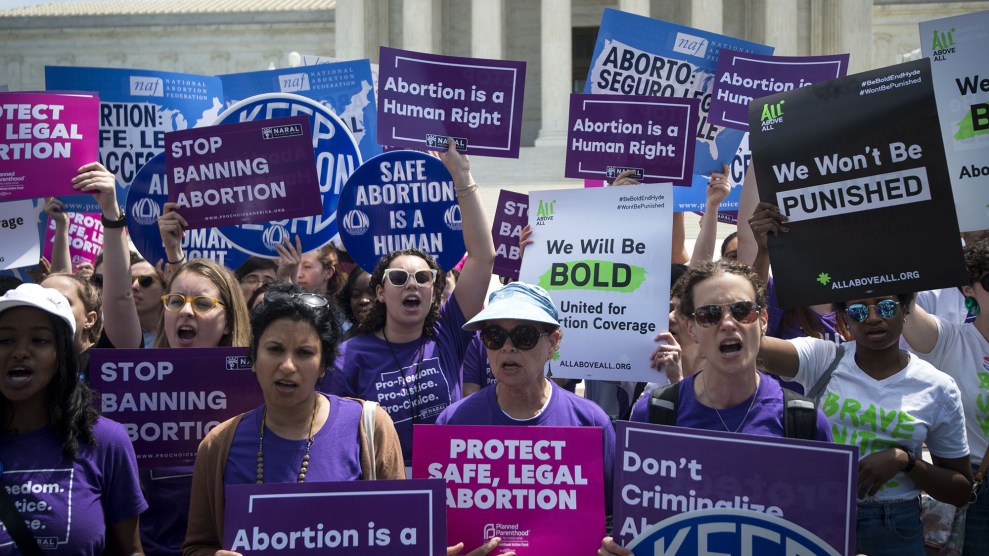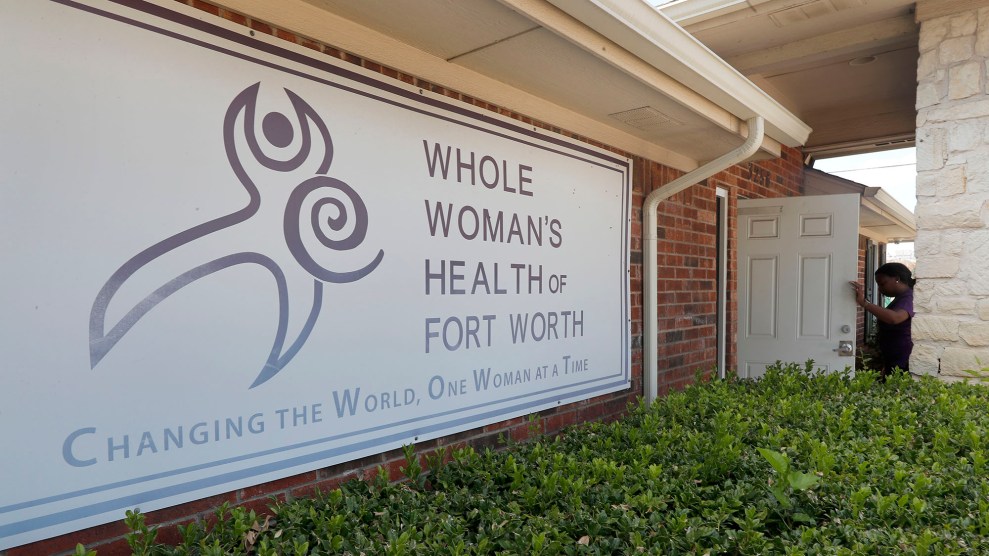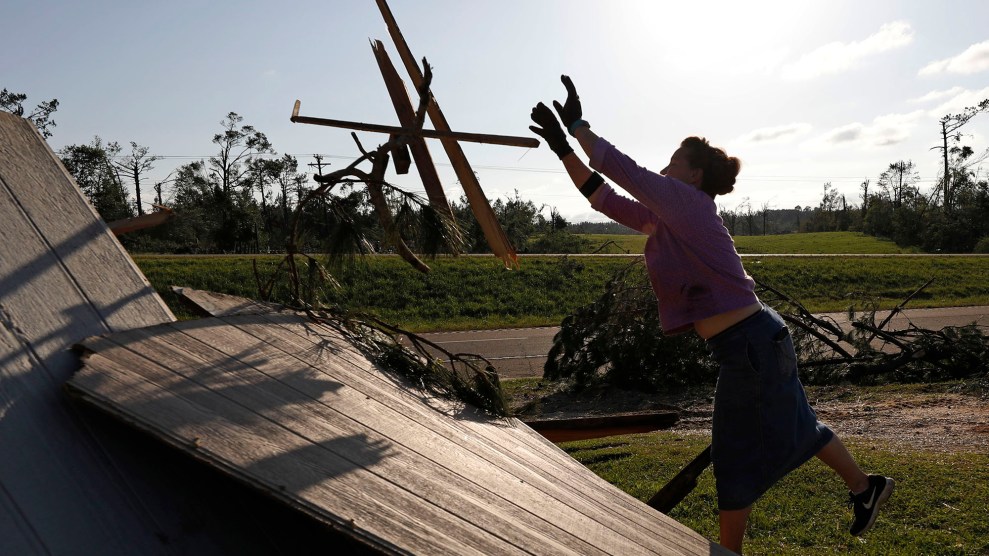
Joanna Lawrence tosses ripped lumber onto a discard pile as she and a team of family and friends clean up the remnants of a home in Collins, Mississippi. Rogelio V. Solis/AP
There wasn’t time to react when the tornado hit John Harvey’s property.
It was Easter Sunday. Harvey’s house is just beyond Collins, Mississippi, over by Terrible Creek. He was sitting on his hearth when the chimney began to shake; for a couple too-long minutes, there was a terrifying blur of debris and rain, and then it was over.
Stunned but unharmed, Harvey made his way out onto his front porch, shaking himself off. A tree had been hurled into the bed of his black pickup truck, crushing a near-perfect “U” shape between the cab and the back wheels. Another tree had crashed into the left corner of his porch. Remnants of the white oaks and poplars that had stood watch over his family for more than a century were now scattered across his land, in a baffling snarl of branches and leaves and twigs. He blinked, trying to adjust to his new landscape. He turned around and went inside to call his daughter on his cellphone to let her know he was safe. Usually, to get signal he has to take his four-wheeler down to the edge of his property, but now that the impeding trees had fallen away, he was able to get through from inside his house, an ironic luxury. For the rest of the night, he hunkered down in his bedroom, one of two remaining dry rooms.
The next morning, a crew of about a dozen men—”neighbors, friends, beer buddies”—arrived with chainsaws, a skid steer loader, and a mini excavator to clear Harvey’s driveway. By midday, a path had formed. The men did not wear masks or worry too much about social distancing; it wasn’t that they weren’t aware of the virus or were unconcerned, but they were also attuned to the pressing need to help a man who was trapped, and then do the same for their other neighbors in need. “They’re just really good people,” Harvey says.
In Collins, a small town of nearly 2,500 just southeast of Jackson, concerns over the coronavirus fluctuate; it’s hard to balance the threat of an invisible virus against unthinkable destruction from a storm that physically shattered homes. So far, COVID-19 has had a fairly unremarkable presence in the area. Since March 11, according to the Mississippi Department of Health, there have been 54 confirmed cases in Covington County, where Collins is located, and no fatalities, as of publication.
The tornadoes that blew through the Southeast over Easter weekend were of historic proportions, killing at least 36 people across 10 states. The National Weather Service has confirmed there were at least 105 storms across more than 770 miles.
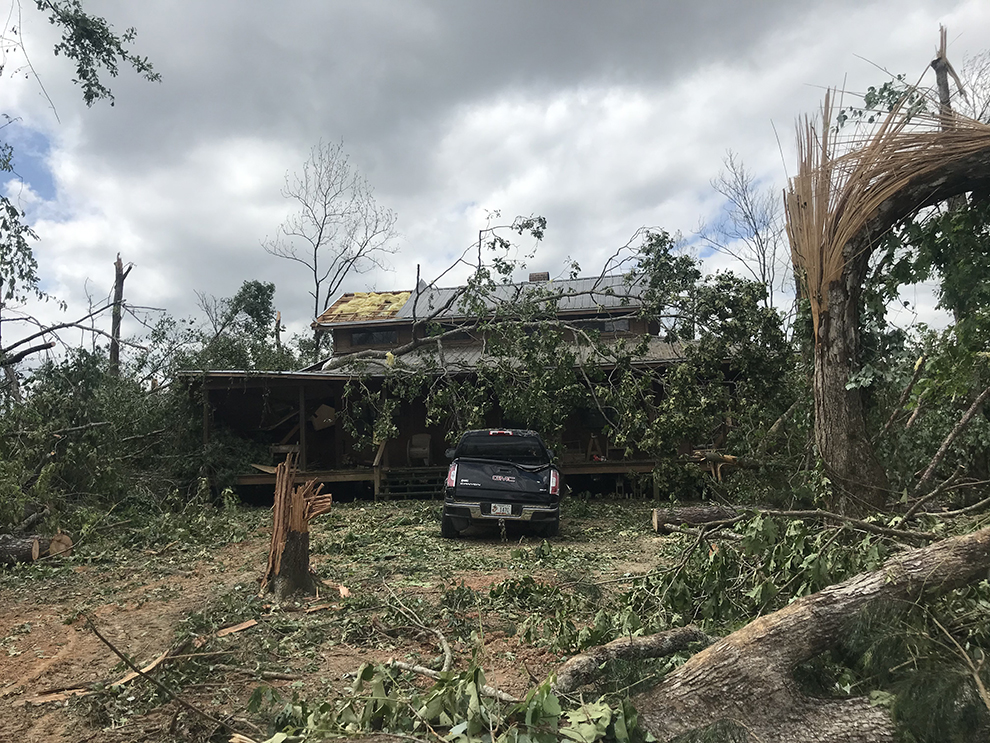
Tornado damage to John Harvey’s property.
Hanna Lane Miller
Over the past few weeks, more than 35 families in the Collins area, most of whom lost everything in the tornado, have taken up residence at the local Best Western. “They’re in shock, they don’t know where to go or what do to next,” says Rachel Pickering, who owns the hotel. “The trailers, they just blew away—there’s nothing left of those but the slab.” Guests filter into the dining room in the morning for coffee and pastries—all other breakfast foods have been suspended in an effort to limit the spread of the coronavirus—and then head out to sort through the wreckage, searching for what’s left of their former lives, or to pick up food or clothing at nearby churches. They return at dusk, exhausted. Pickering says the Red Cross has been helping foot some of the bills for rooms.
At the state’s Emergency Management Department, people file in and out daily, signing up for federal aid. As Greg Sanford, director of Covington County’s branch, points out, a lot of folks, especially elderly people, don’t often use computers, so they come to the office in person to fill out necessary forms online with some oversight. It’s a system that works well there, but these days it is occasionally upended by the coronavirus. One day, someone walked into the department who had been exposed, and “we had to lock the door and we couldn’t allow anyone to come in. We had to do everything curbside,” Sanford tells me. “We’ve got to protect ourselves. We want to make sure people are protecting themselves too when they come to our offices,” though he adds that most people come in wearing masks.
When disaster befalls any community in the South, but especially a small rural one, there’s an instinct to come together. Now, though, that instinct is at odds with the spirit of social distancing and other protective measures as tornadoes have tested a string of Southern communities, blowing through metropolitan hubs like Nashville and small towns like Collins. And each, in their ways, has had to navigate the tricky terrain of balancing the urgency of disaster relief with a burgeoning pandemic that demands a slow, consistent discipline.
“It’s a struggle to know how to help,” says Kendra Miller, who lives with her husband and children in Summit, Mississippi, another small town about an hour southwest of Collins. “Before COVID-19, if you heard of a tornado, you’d be out there digging in the rubble along with everybody else trying to find belongings and helping without even thinking anything of it, drinking out of the same hose together, those types of things.”
In the early days of the pandemic, focus “shifted from the world to the health of my family,” Miller tells me. “And then the tornadoes hit, and it was like, ‘Okay, we’re safe, we’re good, we’re healthy, but there’s need out there.’ So now we’re at a place where we’re able to reach out and say, ‘How do we help others?'”
For the Millers, that’s meant offering up the two small one-bedroom, one-bathroom cabins on their property to their 6-year-old daughter’s first grade teacher, whose family’s home was destroyed in the storms. But it’s been hard to explain to her children why they have to stay six feet away from people, especially people they’ve grown up around, people who may be hurting. Miller’s husband, Kendal, has been going to the neighboring town of Jayess to serve food in the days since the storm, and their daughter begged her parents to let her tag along and help. They relented, telling her that she had to wear gloves and a handkerchief tied below her eyes and that she couldn’t hug anyone there. “It’s hard, our heart and her heart is to serve—you see someone fall down and skin their knee, you wanna run over and pick them up,” she says. “Now you have to do that with a certain type of wisdom.” It’s a hard sort of wisdom for a kid to untangle.
In Nashville, the storms came the night before Super Tuesday. The first coronavirus case in the city was confirmed two days later, on March 5. I went to college in Middle Tennessee, and for a week after the storms, my feeds were a constant scroll of Tennesseans out in the streets in Nashville and another city to the east, Cookeville, clearing debris or pitching in and lining up at local restaurants that were offering to feed those affected. On March 12, Tennessee entered a state of emergency due to the coronavirus.
In North Nashville, home to a vibrant Black community, a grassroots racial justice group called Gideon’s Army quickly began going door to door throughout the neighborhood to discern what was immediately needed for storm cleanup and triage from there. When the number of coronavirus cases in the area began to escalate, they had to come up with new strategies for doling out supplies, spreading information, and keeping their volunteers and the folks they serve safe. It did change a fundamental dynamic that Gideon’s Army believes in: So much of its power rests in its dedication to being in the community and investing resources in building trust, which requires a lot of face time. Now, it had to let people come to them.
Members organized no contact deliveries and much of their communication moved online. But Tee Wilson, chief programs officer, knows that not everyone in North Nashville who needs help has online access. The plan is to post flyers and use graffiti art to get the word out that they’re still working—just at a distance. “COVID is a disaster on top of a disaster, so it’s caused us to stay in triage mode, and just make sure everybody has their emergency needs fulfilled until we can really focus on long-term recovery,” Wilson says.
Assuring stable housing is a particularly complex but urgent problem. There is still a lot of debris out in the neighborhoods, still so many damaged houses, and organizers are afraid to send their folks out to do construction work (though they will tarp up roofs that need it, as storms continue throughout the Southeast). Recently, one woman who needed shelter for herself and her three children reached out to the group, asking if it had a tent she could use. The family had planned to sleep in a park that night. “As soon as Rasheedat [Fetuga, founder of Gideon’s Army] heard that, she went straight to that family and within an hour he had them at a hotel for the night in a safe place to sleep,” Wilson says. “We do everything we can to make sure the families that we serve are not sleeping on the street.” So far, the group has helped eight families get into already-paid-for hotel rooms because they lost their housing.
Navigating a global pandemic on top of a large-scale natural disaster is unprecedented work for Gideon’s Army, but having such a solid foundation has made pivoting to take the coronavirus into account much easier. “It was a natural instinct for us to jump right into this work because this is the work that we were already doing,” Wilson tells me. “We were already feeding the community, we were already out canvassing the community, we were already doing these things—it’s just that now it has to be more logistical and more organized and more accountable.”
Eighty miles away, in Cookeville, there’s a pretty similar scene of communal support. The tornadoes that wrecked North and East Nashville also ravaged the lesser-known metropolitan, home of Tennessee Technological University. A Facebook page, Cookeville Strong, seems to be the heartbeat of recovery in Putnam County—the page has 26,500 members and people post daily, offering free packs of diapers and infant formula and homemade masks, promoting times when drive-thru COVID-19 testing is available at the county health department, organizing free meals at churches. Others post advice for applying for FEMA disaster aid or navigating insurance claims. Still others post updates about reunions with their lost pets, or status updates on those who were hospitalized for injuries sustained during the storms or photos of found belongings around town. The sheer range of posts is evidence of a community struggling on multiple fronts.
“Now people don’t have their jobs or homes,” says Caroline Moore, who lives in New York but came home to Cookeville to wait out the pandemic with her parents. “It’s just heartbreaking.”
Cleanup is ongoing in Cookeville. Moore says she went out one weekend to the fairgrounds to volunteer. There—from six feet away—a woman named Debbie instructed her to sign a waiver (keep the pen, please), pick up supplies, including fresh gloves, and head to a specific address where the remains of a demolished house had been bulldozed down. She worked alongside a couple from Knoxville. They kept their distance, but the comfort of each other was stabilizing amid the emotion of sorting through a stranger’s belongings, brushing dirt from DVDs, dolls, knives, a single shoe.
Chattanooga, in East Tennessee, only a couple hours’ drive south from Cookeville, was hit by tornadoes the same night they tore through Mississippi. There, two people died, and according to Mayor Andy Berke, about 140 people were displaced and are now living in hotels and shelters. “There’s a whole bunch of problems going on,” Berke tells me. “At the same time, we’ve got COVID-19 as a global pandemic, we have a work stoppage that is affecting our economy, we have the mental toll this is taking on our community, particularly when it comes to fear, and on top of that, we had the storms…this is a lot for any community.”
In the early morning after the storms, careful communication and organization were key. Morning Pointe of Chattanooga, a nursing home, had to be evacuated after its roof had been decimated. Responders had to shelter residents in place until transportation could be arranged via several vans to maintain social distancing, all while clinical staff worked to maintain medicine schedules. “You can’t just put everyone in the same place,” Berke says. “You gotta figure out how to get masks on people, where to put people, try to stay as best you can within the CDC guidelines.”
Berke fears the economic consequences of the pandemic on top of a natural disaster. Tennessee is a state without an earned income tax; it relies on other taxes to meet its public funding needs. “COVID-19 also lowered our tax base,” he says. “We have mainly real estate taxes, but a big piece of our revenues come from sales taxes and hotel/motel taxes. COVID-19 affects both health and the economy, and then on top of that, you add a tornado, the need for government response is heightened at a moment when the tax revenues are being lowered.”
Amid all the upheaval, Berke stresses the need for “social cohesion” while adhering to social-distancing practices—whether that’s through social media or through volunteering to help with tornado cleanup. “We need members of our community to be looking out for each other, even when they themselves are hurting.” Still, according to data from the Dartmouth Atlas Project, Chattanooga has the second-fastest-growing rate of confirmed coronavirus cases. Tennessee began to relax some of its pandemic-related practices on Monday, even as the state saw its highest jump in single-day confirmed cases the day prior. As of Tuesday, the state had 10,052 confirmed cases and 188 fatalities.
For now, the recovery effort continues. Back in Mississippi last week, Harvey was trying to suss out if the insurance adjuster was low-balling him. He asked a friend he trusts, a contractor, to come out and assess the damage after the adjuster had gone, just to be sure the estimates lined up. When his friend arrived, he told Harvey that he had a cough and a low fever, but he felt good enough to take a look around and crunch the numbers later. He promised Harvey he would get to work on the house as soon as he could. Harvey encouraged his friend to get a COVID-19 test, but because the contractor had heard that there was a shortage of tests, he said he didn’t want to take one—leave those to the folks who are really sick or have preexisting conditions. A doctor from nearby Laurel had appeared on TV a few nights before saying as much. After some coaxing, the contractor eventually went and got a test. He is awaiting the results.
If you ask him, though, Harvey will say he’s not too concerned about contracting the virus—even though he’s over 65, no matter his partial colectomy from last year. He’s most concerned with rebuilding his life, piece by piece.
Additional reporting from Collins, Mississippi, by Hanna Lane Miller.

